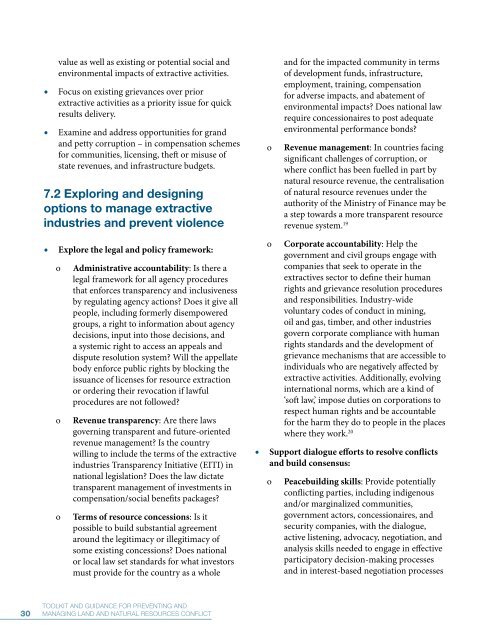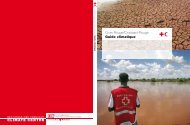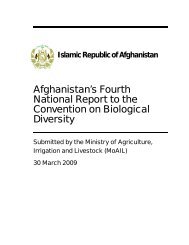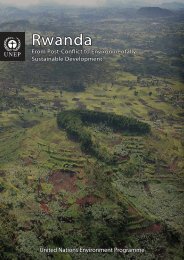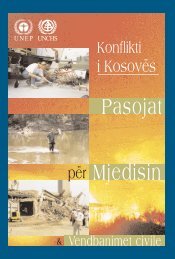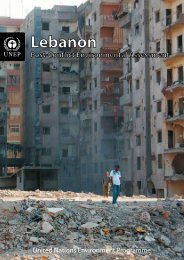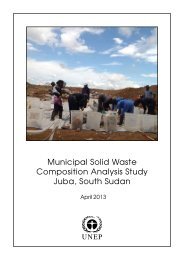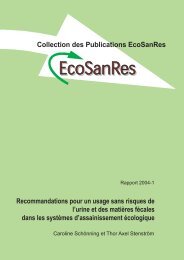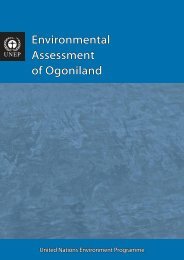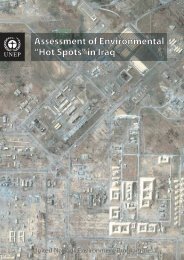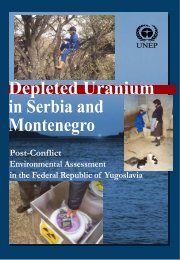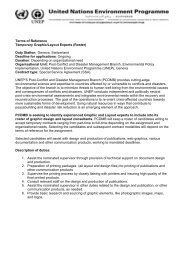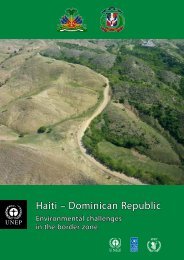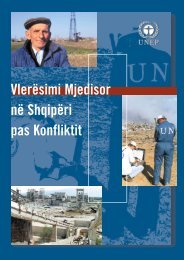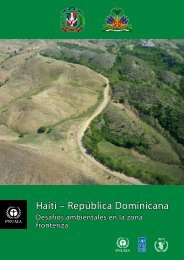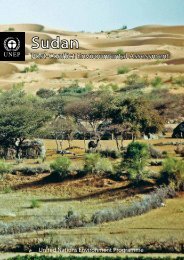Strengthening capacity - Disasters and Conflicts - UNEP
Strengthening capacity - Disasters and Conflicts - UNEP
Strengthening capacity - Disasters and Conflicts - UNEP
You also want an ePaper? Increase the reach of your titles
YUMPU automatically turns print PDFs into web optimized ePapers that Google loves.
value as well as existing or potential social <strong>and</strong><br />
environmental impacts of extractive activities.<br />
Focus on existing grievances over prior<br />
extractive activities as a priority issue for quick<br />
results delivery.<br />
Examine <strong>and</strong> address opportunities for gr<strong>and</strong><br />
<strong>and</strong> petty corruption – in compensation schemes<br />
for communities, licensing, theft or misuse of<br />
state revenues, <strong>and</strong> infrastructure budgets.<br />
7.2 Exploring <strong>and</strong> designing<br />
options to manage extractive<br />
industries <strong>and</strong> prevent violence<br />
o<br />
<strong>and</strong> for the impacted community in terms<br />
of development funds, infrastructure,<br />
employment, training, compensation<br />
for adverse impacts, <strong>and</strong> abatement of<br />
environmental impacts Does national law<br />
require concessionaires to post adequate<br />
environmental performance bonds<br />
Revenue management: In countries facing<br />
significant challenges of corruption, or<br />
where conflict has been fuelled in part by<br />
natural resource revenue, the centralisation<br />
of natural resource revenues under the<br />
authority of the Ministry of Finance may be<br />
a step towards a more transparent resource<br />
revenue system. 19<br />
Explore the legal <strong>and</strong> policy framework:<br />
o<br />
o<br />
o<br />
Administrative accountability: Is there a<br />
legal framework for all agency procedures<br />
that enforces transparency <strong>and</strong> inclusiveness<br />
by regulating agency actions Does it give all<br />
people, including formerly disempowered<br />
groups, a right to information about agency<br />
decisions, input into those decisions, <strong>and</strong><br />
a systemic right to access an appeals <strong>and</strong><br />
dispute resolution system Will the appellate<br />
body enforce public rights by blocking the<br />
issuance of licenses for resource extraction<br />
or ordering their revocation if lawful<br />
procedures are not followed<br />
Revenue transparency: Are there laws<br />
governing transparent <strong>and</strong> future-oriented<br />
revenue management Is the country<br />
willing to include the terms of the extractive<br />
industries Transparency Initiative (EITI) in<br />
national legislation Does the law dictate<br />
transparent management of investments in<br />
compensation/social benefits packages<br />
Terms of resource concessions: Is it<br />
possible to build substantial agreement<br />
around the legitimacy or illegitimacy of<br />
some existing concessions Does national<br />
or local law set st<strong>and</strong>ards for what investors<br />
must provide for the country as a whole<br />
o<br />
Corporate accountability: Help the<br />
government <strong>and</strong> civil groups engage with<br />
companies that seek to operate in the<br />
extractives sector to define their human<br />
rights <strong>and</strong> grievance resolution procedures<br />
<strong>and</strong> responsibilities. Industry-wide<br />
voluntary codes of conduct in mining,<br />
oil <strong>and</strong> gas, timber, <strong>and</strong> other industries<br />
govern corporate compliance with human<br />
rights st<strong>and</strong>ards <strong>and</strong> the development of<br />
grievance mechanisms that are accessible to<br />
individuals who are negatively affected by<br />
extractive activities. Additionally, evolving<br />
international norms, which are a kind of<br />
‘soft law,’ impose duties on corporations to<br />
respect human rights <strong>and</strong> be accountable<br />
for the harm they do to people in the places<br />
where they work. 20<br />
Support dialogue efforts to resolve conflicts<br />
<strong>and</strong> build consensus:<br />
o<br />
Peacebuilding skills: Provide potentially<br />
conflicting parties, including indigenous<br />
<strong>and</strong>/or marginalized communities,<br />
government actors, concessionaires, <strong>and</strong><br />
security companies, with the dialogue,<br />
active listening, advocacy, negotiation, <strong>and</strong><br />
analysis skills needed to engage in effective<br />
participatory decision-making processes<br />
<strong>and</strong> in interest-based negotiation processes<br />
30<br />
TOOLKIT AND GUIDANCE FOR PREVENTING AND<br />
MANAGING LAND AND NATURAL RESOURCES CONFLICT


